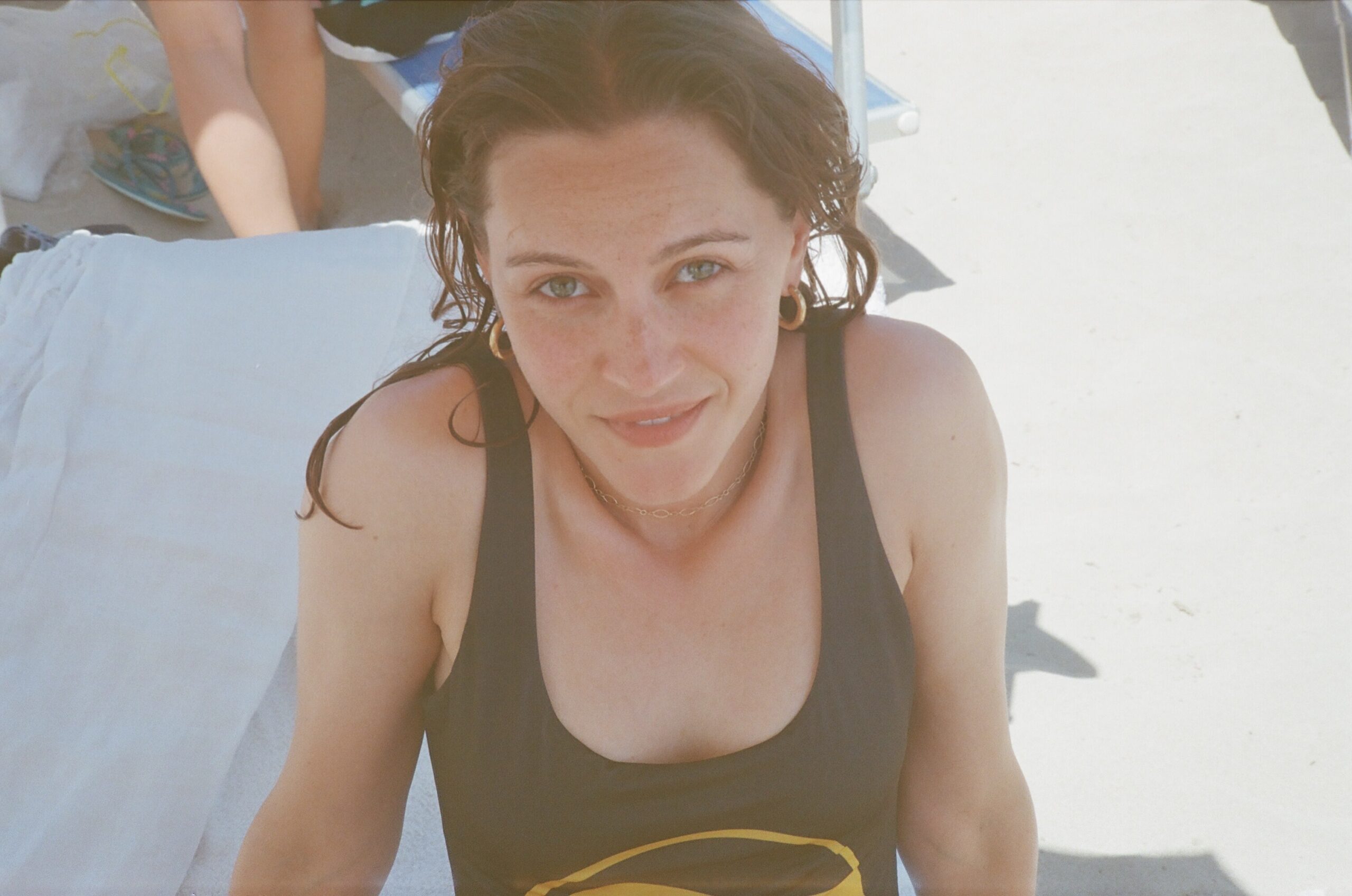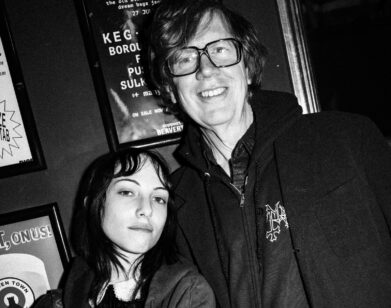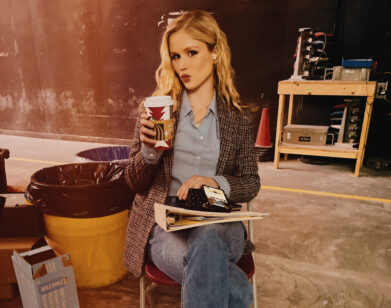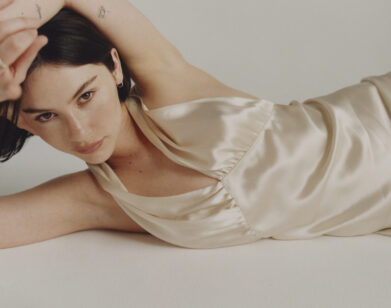LIT
In Her Debut Novel, Hannah Regel Tackles the “Great Horror of Life”

Hannah Regel, photographed by Joe Walsh.
There are some words that have stuck with me from the moment I read them, so much so that I can recall them from memory. Among them is the last stanza of Hannah Regel’s poem “Fashion First Always,” which reads: “Until then I’ll stay friendly / I’ll stay friendly and I’ll say hi! / In my tight clothes, I’m in my tight clothes / And I’m saying hi / That’s genius right there/ That’s acting.” All good poetry captures something unseeable through language. In Regel’s case, her poetry as well as her fiction gives the sensation of the author winking at you from behind the page.
Regel started out as a fine artist before turning to poetry and, eventually, fiction. “One just overtook the other,” she explains, “and people seemed to like the writing more.” Her debut novel, The Last Sane Woman, out this week, follows three women, decades apart: Nicola, listless and a few years removed from an art degree, becomes obsessed with the asymmetrical correspondence between potter Donna and her friend Susan, perceiving in Donna’s life a mirror to, and potential model for, her own. Though marketed as a novel about art and envy, Regel says the novel is more about a “crisis of desire.” On a humid June afternoon in London, she and I met up to talk about the limits of first-person writing, her research into the UK Arts & Crafts movement, and the often farcical nature of class dynamics. “A sense of humor is maybe all you can ask for from a person,” she told me. “And unfortunately, not everyone has it.”
———
ZSÓFIA PAULIKOVICS: Thank you so much for having me here in your husband’s parents’ garden.
HANNAH REGEL: Pleasure.
PAULIKOVICS: Well, we can get straight into it. You’ve had quite an interesting trajectory into writing because you started out as a fine artist, right?
REGEL: Yeah.
PAULIKOVICS: And you were a poet before writing a novel. I was wondering how you made the shift from making art to writing poetry and then to fiction, and whether you always knew that you were going that way.
REGEL: It wasn’t thought out, but the writing was always there. Even when I was doing my BA, I did a little poetry pamphlet to go with the sculptures.
PAULIKOVICS: What kind of art were you making?
REGEL: Sculptures that were strange, but there was always a written component that went along with it. And then one just overtook the other and people seemed to like the writing more.
PAULIKOVICS: Did you like the writing more?
REGEL: Yeah, it probably feels more true or something. And I couldn’t flog the art to anyone, no one cared or was interested.
PAULIKOVICS: So you went into the much more lucrative world of writing fiction.
REGEL: Yes. Or it just seemed to easily unfold in a way that didn’t feel lik—it’s nice to not have to sing for your supper, whereas with the art, it seemed I had to really push it.
PAULIKOVICS: Yeah. I wanted to talk about it being a London novel because it feels to me so much like a London novel, but when you write about other parts of England, they are just as vivid. There’s not that much fiction writing being done about London at the moment, that’s not just like, ‘psychogeography’. Was that conscious or just a function of the fact that you have lived in London for a long time?
REGEL: The boring answer is yeah, it’s just where I live, but maybe the more interesting answer would be that it is really about England in lots of ways, in setting and in manners as well.
PAULIKOVICS: Yeah, and some of the class dynamics. It was done in a really fun way, like when Donna goes to someone’s country house, it feels both aspirational and like you’re an outsider.
REGEL: Yeah. And all the characters had to be outsiders from London and then move into it. That felt important.
PAULIKOVICS: So obviously the easy way to sum up the book is that it’s about making art and envy and friendship. What about that interested you?
REGEL: It’s funny, the envy thing. It’s been marketed like that, but I don’t think it’s really about envy. Maybe the relationship that they both have with the character Leonie could be envious, but most of the time it’s just longing. Or it’s more wistful, more like pining.
PAULIKOVICS: Yeah, and trying to find a model for your own life.
REGEL: Yes, it’s more watchful.
PAULIKOVICS: Exactly.
REGEL: And there’s judgment in it, but envy implies a blind desire, whereas what’s happening is slightly more conflicted when you’re looking at other people.
PAULIKOVICS: I think it’s also when you’re aware that there is something lacking in your own life, but you don’t know what exactly. It’s quite attractive to look at other people and be like, well, that could be it. I don’t know if this is something you said or other people have said again, but I like it being about a crisis of desire. It’s hard to know what one should want.
REGEL: Right, it’s confusing. And even if envy is confused or misguided, it has a direction to it. It’s like, “I want this.” Whereas what’s happening between all these people, it’s more chaotic than that. It doesn’t have a direction.
PAULIKOVICS: That strikes some of the other parts of my question. I was going to ask if this mode of thinking, the chaos of path finding or the watchfulness felt related for you to art making, or the creative production process?
REGEL: Yeah, the creative process is maybe an amplified metaphor for it, because it’s so lonely and only you can do it, right? Even if you try and emulate someone else, it will always just be how you do it. There’s no other way around it. But the creative process may be a more condensed metaphor for how to construct a life. And also, no one knows what they’re doing. You think you’re making something or you’re living a certain way, but no one has any idea how they appear to other people and you never can.
PAULIKOVICS: Yeah. And yet you want to know so much as if it’s going to help.
REGEL: Yes, and we never will. That’s the great horror of life.
PAULIKOVICS: It’s interesting that the creative process is a smaller scale metaphor for all of life, which I think is really cleverly done in Susan’s character where all these same feelings are relevant to her, and what she’s creating is a family.
REGEL: Yes, and she’s not an artist. She works at the bank.
PAULIKOVICS: I like that, the idea that that’s an occupation for everyone. It is a nice way to look at the human psyche that there’s a base creativity in everyone. Both the novel’s structure and the way the characters are built up felt very ambitious and well done. Do you want to give a little summary of the structure just so that I don’t bungle it?
REGEL: Yeah. So it’s told through three women in various different modes. There’s an artist as she’s living her life and then it’s being read by someone after her death in an archive. And then you also have her friend who was her contemporary while she was alive, watching her live. So there’s a triangulation of someone looking from the present into the past and then someone watching as it’s happening and then someone just completely moving without watching anyone else.
PAULIKOVICS: And it’s an epistolary novel of sorts, but one-sided. There was letter writing happening between Susan and Donna, but as Susan’s side is missing, Nicola, the contemporary character, feels like they were written for her.
REGEL: Yes. Conceptually there are so many holes in it, and it kind of has to have that, so that you never quite get the full scope of anyone.
PAULIKOVICS: Which is a good way to get through that we’re all looking at each other and being looked at but there’s never an objective view of who you are or other people are.
REGEL: Yeah, and there are things that are unknowable and secret.
PAULIKOVICS: Another part of my question was that it feels like, especially for debut authors, autofiction is often the go-to form. Did that ever appeal to you or did you always know it was going to be told through other people?
REGEL: Honestly, it started off as these letters, which are first-person obviously, and then there was the present day counterpoint where the person reading them was first-person. It just went back and forth, and everyone that I showed it to or got any feedback from was like, “This is so boring.” It was essayistic and it referenced other writers and it was quite self-aware and it was just dull. It was my husband’s idea to make Susan a character, and as soon as I started writing her in, I found it so much easier to write in the third person, and I enjoyed it and it moved a lot quicker. I redid all the other parts in third person and it made so much more sense. I think when something’s first-person, because you’re saying ‘I’ it feels so revealing that you hold back a little bit or I did, I found.
PAULIKOVICS: Yeah, I know what you mean. That’s a really interesting point because there’s very few people who can capture their own subjectivity. There’s always an instinct to be like, “I know what I’m doing.” It’s like, I know I’m being ridiculous, and it is much easier to capture other people in their un-self-awareness.
REGEL: And it was just way more fun also. It wasn’t funny when it was in the first-person.
PAULIKOVICS: Yeah. Well, that actually brings us quite nicely to a different question that I had about humor, because to me your writing is very funny. I hope you don’t mind me saying that.
REGEL: No, I’m glad.
PAULIKOVICS: Both your poetry and your fiction, and even nonfiction pieces, there’s an inherent humor in them. I wondered whether that’s important to you and how you go about depicting that.
REGEL: Yeah. It’s a hard question to answer, isn’t it? Because I’m glad that you find it funny and I value a sense of humor in a person. It’s maybe all you can ask for, right?
PAULIKOVICS: But it’s also, you can’t make yourself funny if you’re not.
REGEL: Yes. It didn’t feel purposeful, but I’m glad that it has ended up like that.
PAULIKOVICS: I wonder if the regionality has some of that as well. There’s a lot of humor in being provincial.
REGEL: Yeah. And in the class thing as well that you mentioned, manners or the mistakes that happen with that are funny. It doesn’t have to be like, “Oh, class divide, it’s so awful.”
PAULIKOVICS: Right. And let’s be honest, there’s really funny things happening in the art world.
REGEL: Yes. It’s all just farcical and it doesn’t have to be this great heavy thing.
PAULIKOVICS: For my next question I just wrote, “Why pottery?”
REGEL: Because it works as a metaphor with the physical, what we were talking about before with life and the creative act. And the archive, maybe more to the point, it’s this very malleable thing, it’s like clay. Then it undergoes this process and then it’s fixed and it’s permanent. And people’s lives, I suppose, have that quality, especially archived lives. It’s a very malleable and alive thing and then all of a sudden you put it in a box and it seems so…
PAULIKOVICS: Fixed.
REGEL: Yeah. So maybe it works in that sense as a metaphor. But also I liked that she has all these fantastic little ideas about her career, like she’s going to be very famous or successful.
PAULIKOVICS: Revolutionize the pottery world.
REGEL: Exactly. But pottery is quite a niche, and it’s not that trendy or fashionable.
PAULIKOVICS: Well, it’s trendy in the sort of, I don’t want to sound horrible.
REGEL: It’s getting trendy now.
PAULIKOVICS: Exactly, in an Instagram explore way. There’s lots of people that have gotten into a bit of pottery.
REGEL: But it has risible elements to it. It seemed to fit more than if she was a painter.
PAULIKOVICS: Yeah. What I do really like about it being pottery is that it feels like it bridges craft and women’s art. I’m doing air quotes.
REGEL: And it’s not taken seriously by the art world. When I was researching it, I read a lot about the Arts and Crafts movement in Britain, and with so much of that movement and pottery especially, it was all about a way of life. It was a way to live an alternative life and you make your pots and that’s your income, but it’s also a spiritual endeavor that bleeds into every part of how you live. It was an art movement that already had a philosophy attached in a way that other practices don’t. Like painting doesn’t really have a model for living that goes hand-in-hand with it. Does this make sense?
PAULIKOVICS: Yeah, that makes sense. I was thinking about whether there’s any contemporary versions of that.
REGEL: No. And this was interesting when I was reading about it, how that mode of alternative living as a maker got completely decimated by Thatcher.
PAULIKOVICS: Exactly. The art movement of the era felt really nicely captured for me. And also, you don’t really make any direct ties to the present, but this is something I think about so much, that system of the art college and people who would’ve created in that context. Art colleges, which were free, shaped so much of what the art world was like at the time, which is not to say that it was without its class dynamics, but it made possible this creation that is not really happening now.
REGEL: And it was much more communal, from my understanding of it. And the shift to it being so individualistic as a pursuit is so tied to what Thatcher did to arts funding, where you had to then prove that you had a viable career, you couldn’t just be a maker for making’s sake.
PAULIKOVICS: Yeah. I wondered about your research process in general, which we did touch on, but I was wondering if you did any of that about the London art world specifically.
REGEL: Yeah. I read lots of books. A friend put me in touch with Alison Britton, who’s a potter, who was living and working in the ’80s. I went to her house a couple of times and she was so, so helpful. A lot of what she said is just direct depictions, like having to wee in the park outside the studio, and all the babies in baskets on the stools. She gave me lots of books to read and introduced me to a writer called Tanya Harrod, who’s an art historian. She has this amazing book about the Arts and Crafts movement in the 20th century.
PAULIKOVICS: I wondered if you think there’s something about the female artist experience in the ’80s that is interesting to us now. Or maybe because of the funding structure and our way of living now, it’s something that we can only ever pine after. Maybe that’s why we’re so attached to it.
REGEL: Yeah. I think the specificity of being a female artist, or the specific struggle of that is because women are supposed to do something else, or there’s a dichotomy or there’s a bit of friction, right? Because it’s very, very, very selfish maybe and men don’t have to deal with that question.
PAULIKOVICS: Yeah, or it’s like if you’re a female artist then your art should be about being a woman. And if it’s not, then you failed to capture the big topic at your disposal, which is being a woman.
REGEL: Yes. I made my own bed maybe because “Woman” is in the title. They’re also just people, but it becomes so much about the female experience, whereas if it was a book about three men and their friendship, I don’t think you’d have endless questions about the male experience.
PAULIKOVICS: So where you spoke a bit about what you were reading, I was wondering about the juicy side of this question, which is, who are your influences both in a healthy-ish way as an artist, or whether you’ve had any that you’ve over-identified with in that way?
REGEL: It’s funny, isn’t it, influences? All the people whose writing I really admire and, not study, but think about, it’s just so not how I write. It’s like Amy Hempel or something. Really bare and precise and that’s my ideal. And then whatever comes out the other end is convoluted metaphors and quite barmy.
PAULIKOVICS: I find that I end up being Nicola-esque about everyone whose writing or work I like. I look up their star sign and their personal life page on Wikipedia and I really am like, “I’m going to know you as a person.”
REGEL: I’m so deeply incurious. I never look up anyone.
PAULIKOVICS: Really?
REGEL: Yeah. I don’t know about anyone’s life.
PAULIKOVICS: I know about their life sometimes more than their work, which probably makes me not a very elevated writer or thinker.
REGEL: No, when people know so much about the people they admire I always find it to be very interesting.
PAULIKOVICS: How did the idea that one of your characters would become so obsessed with someone else come to you?
REGEL: People do it, don’t they? I find it interesting because people do have that relationship with people.
PAULIKOVICS: You think you know them.
REGEL: And people have certain artists or writers that they build their lives around. It’s just an impulse that I don’t have. I imagine it would be fulfilling, but also very unpleasant to be so consumed with someone else who you can’t ever know or meet. It gets masochistic almost.
PAULIKOVICS: It is. What are you working on next?
REGEL: A novel, this time purposefully meant. My dad’s Indian, he grew up in India and it’s about his family. He has two, one of them dead so he has one, but he had two sisters. But for the sake of the novel I’ve made them more, because that’s more fun. So it’s about all the sisters in India.
PAULIKOVICS: Amazing. Well, thanks so much, Hannah. It was lovely to chat with you.
REGEL: And the cat came right at the end.
PAULIKOVICS: Oh my god. The cat’s here now. I love a black cat.






